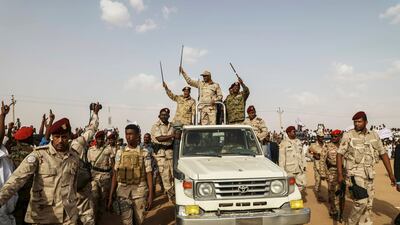Libya's 5+5 military committee of officers from both main warring sides has agreed on a co-ordination mechanism for the withdrawal of foreign forces in liaison with neighbouring Sudan and Niger, the UN said on Wednesday.
The decision was announced at the conclusion of a two-day meeting in Cairo chaired by the Special Representative of the UN Secretary General for Libya, Abdoulaye Bathily.
Representatives of Libya's neighbouring countries — Sudan, Chad, and Niger — were also in attendance at the meeting.
Mercenary groups from the three African countries have been heavily recruited by both sides of the civil war, according to a 2019 UN Security Council report.
The agreement comes after representatives from the rival administrations met in Cairo in January for talks hosted by Egyptian Parliament Speaker Hanafy El Gibaly.
January's talks brought together Khaled Al Mishri, chairman of the High Council of State — an advisory body to the Tripoli-based government — and Aguila Saleh, speaker of the parliament based in eastern Libya.
The pair issued a joint statement after the meeting announcing they had agreed to “chart a clear and well-defined road map, to be later announced, to complete all the necessary steps to carry out the election process in regard to the basis and laws as well as the executive steps and unifications of institutions”.
An action plan for the withdrawal of foreign forces from Libya was devised at a meeting for the 5+5 committee in Geneva last October. The committee met again in Cairo in November to finalise it.
Bathily, who met with Egyptian foreign minister Sameh Shoukry on Tuesday, said the latest talks were held to move forward on the plan devised in November, particularly with regards to the removal of foreign fighters.
In a statement after the meeting with Bathily, Shoukry reiterated Egypt's unchanged position that general elections are the highest priority for Libya.
He warned that the heavy presence of foreign fighters in Libya has sent the country into chaos and that it must end.
Libya failed to hold general elections in 2021 due to disagreements over election laws among its various factions.
Since a popular uprising in 2011 ended in the death of autocrat Muammar Qaddafi, Libya has been torn by divisions and violence. Armed groups have sectioned off the country and wield significant influence over politicians.
Egypt has repeatedly endeavoured to broker a peace between both sides, hosting a number of peace talks over the years with limited progress. Cairo fears the heavy presence of militant groups and foreign mercenaries could spill over into its porous border with Libya.
Abdul Hamid Dbeibah, the head of one of Libya's two rival governments, said his Tripoli-based administration was ready to hold delayed elections this year, vowing that 2023 will be one of “elections and the unity of institutions”.

